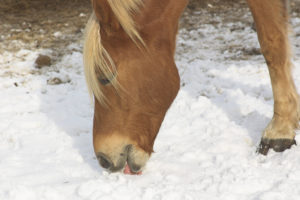
Feeding an Easy Keeper on Stall Rest
A nutrition expert offers advice on preventing weight gain and boredom while a hefty horse is on stall rest.


A nutrition expert offers advice on preventing weight gain and boredom while a hefty horse is on stall rest.

An equine nutritionist shares tips to reduce impaction colic risk in senior horses, focusing on hydration, digestion, proper feeding practices, and more.

Researchers found that a herd of Icelandic horses survived after their water source froze amid snowstorms. But, as a rule, horses should always have access to fresh water.

Horses with certain health conditions should skip sweet treats. Find out if your horse is one.

Horses that are used to being on pasture during the spring, summer, and fall might experience nutrient deficiencies during the winter.

From nutrition considerations to preventing mud, it’s time to get ready for the long stretch of winter conditions.

As your horse ages, dental problems might develop that require changes to his diet.

Find out how to safely feed horses fat and if it’s a good weight-gain solution.

Horses tend to drink less as the temperature of their water drops. However, when given the choice between cold and warm water, horses consume the former.

One equine nutritionist weighs in on which type of hay best helps horses stay warm during cold nights.

Do you struggle to get pills into your horse? A nutritionist offers advice and some precautions.

Do you want a festive fall treat for your horse? Find out if pumpkin is a safe choice.

Rapid weight loss can lead to hyperlipemia, a serious and sometimes fatal condition.

One’s designed to be the horse’s whole diet, while the other is meant to complement his forage ration. Which is best for your horse?

A nutrition expert offers care and feeding tips for a thin senior horse before the cold weather hits.

An owner asks for help feeding her mare who needs to gain weight but is proving to be a picky eater. An equine nutritionist shares some advice.
Stay on top of the most recent Horse Health news with